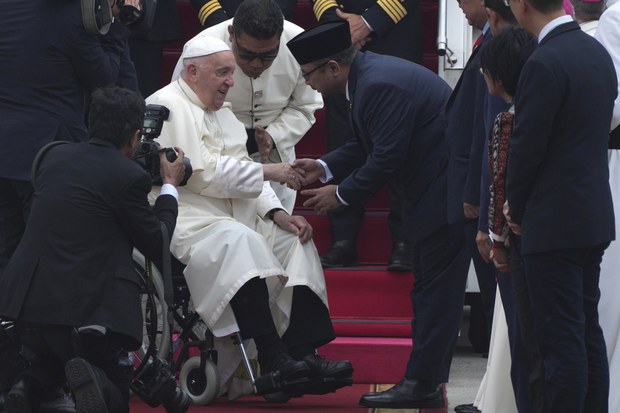
Pope Francis delivered a cautionary message against religious extremism during his visit to Indonesia, a country with a predominantly Muslim population
Pope Francis emphasized the importance of political leaders in Indonesia, the world’s most populous Muslim-majority country, to remain vigilant against the dangers of religious extremism. He highlighted that such extremism can manipulate people’s beliefs through deceptive tactics and resort to violence.
During the initial day of his extended overseas trip, which spans nine days in Southeast Asia, where Christians constitute a small minority, the pontiff engaged with local Catholics and advised them against imposing their religious beliefs on others.
During a speech delivered to Indonesia’s political leaders, Francis announced that the Catholic Church will intensify its endeavors in inter-religious dialogue with the aim of mitigating extremism.
The 87-year-old pope expressed in an address at Jakarta’s presidential palace that by following this approach, biases can be eradicated, and a conducive environment of mutual respect and trust can be fostered.
According to Francis, this is an essential tool for addressing prevalent challenges, such as combating extremism and intolerance. These challenges involve the manipulation of religious beliefs to promote deceptive and violent agendas.
The Muslim population in Indonesia accounts for approximately 87% of the total population, which is estimated to be around 280 million. The country’s constitution guarantees freedom of religion.
Indonesia has experienced instances of Islamist violence in recent years, such as the suicide bombings in 2021 and 2022 that were connected to a group inspired by Islamic State. However, there has been a decrease in religious extremism since a series of notable attacks that occurred two decades ago, including the 2002 Bali bombing. This attack resulted in the loss of 202 lives, including 88 Australians.
The President of Indonesia, Joko Widodo, expressed gratitude to Francis for his advocacy of a ceasefire in the Israel-Gaza conflict, a position he has held for a decade.
The speaker expressed Indonesia’s appreciation for the Vatican’s consistent advocacy and vocal support for peace, as stated in his welcoming address.
The concept of religion being ‘manipulated’
Upon the arrival of his car at the presidential palace, Francis was warmly welcomed by enthusiastic crowds who waved small Vatican and Indonesian flags.
Dorothea Dawai, aged 10, was part of the group that extended a warm welcome to the pope. The individual was observed wearing a green kebaya, which is a traditional Indonesian dress. It was expressed that the purpose of wearing the dress was to seek a blessing.
The Pope, who experiences knee and back pain, utilized a wheelchair to exit his vehicle and greet the president in front of the establishment.
During his public remarks, Francis refrained from discussing any particular instances of violence. However, he did touch upon the topics of extremism, intolerance, and the exploitation of religion.
The pontiff expressed concern about instances where faith in God is unfortunately exploited to incite divisions and foster animosity, rather than promoting peace, unity, dialogue, respect, cooperation, and brotherhood.
The Indonesian Foreign Minister, Retno Marsudi, stated that during their meeting, Francis and Widodo did not discuss the Gaza war specifically. Instead, they focused on ongoing conflicts in general and emphasized the significance of peace.
Avoiding the imposition of religious beliefs
Francis subsequently had a meeting with members of the Catholic community at the cathedral in Jakarta. A large gathering of individuals, consisting of hundreds of people, assembled outside to witness his presence. Among the attendees was a young child who was attired in a papal costume.
Within the confines of the church, the children engaged in the performance of the angklung, a customary musical instrument made of bamboo, while eagerly anticipating the arrival of Francis.
The pope was seated at the rear of the cathedral, beneath a ceiling made of Teak wood. He attentively received concise testimonies from four individuals who identified as Indonesian Catholics.
An individual, identified as a nun, managed to evoke a smile from Francis. This person requested that he exert pressure on Vatican officials to expedite the process of translating Catholic texts into Indonesian.
The Pope incorporated impromptu additions and humorous remarks into his prepared remarks. The individual expressed admiration for the cultural diversity in Indonesia and emphasized to the Catholic community that adhering to the teachings of the church should not involve imposing their faith on others or creating conflicts with other belief systems.
The Pope is scheduled to depart from Indonesia on Friday, followed by visits to Papua New Guinea, East Timor, and Singapore. By the time he returns to Rome on September 13th, he will have traveled approximately 33,000 km (21,000 miles).
Pope Francis has placed a strong emphasis on fostering dialogue between the Catholic and Muslim communities. In a significant milestone, he became the first pope to visit the Arabian peninsula in 2019. On Thursday, the individual will participate in an inter-religious gathering scheduled to take place at the Istiqlal Mosque in Jakarta, which is recognized as the largest mosque in Southeast Asia.
All Categories
Recent Posts
Tags
+13162306000
zoneyetu@yahoo.com



